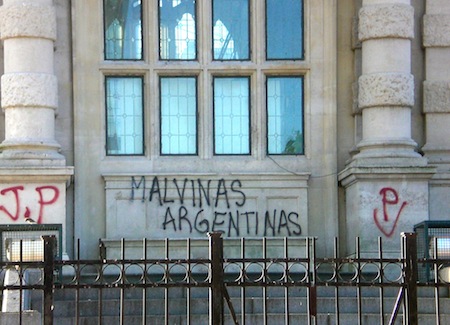On Sunday and Monday, 1,517 eligible voters in the Falkland Islands (or, if you like, las Islas Malvinas) turned out to vote in the referendum on its status as an overseas territory of the United Kingdom.![]()
![]()
![]()
Fully 1,513 voters supported the current status, and three voters disagreed.
That should be an open-and-shut-case, right? Certainly under any principles of self-determination, a 99.74% victory for remaining under the aegis of the United Kingdom should be respected — the residents of the small islands that the United Kingdom (and the residents themselves) call the Falklands Islands and that Argentina call the Islas Malvinas, which lie just 310 miles off the coat of Argentine Patagonia (and over 8,000 miles from London).
Not so fast.
The dispute goes back to 1833 — and really, even further:
- To the 1520s, when Argentines claims that Ferdinand Magellan discovered them on behalf of Spain.
- To 1690, when the British say that captain John Strong first landed on the islands, naming them for Viscount Falkand.
- To 1764, when both sides agree that France settled Port Louis, though the Argentine and British stories vary as to what happened next — a British expedition certainly arrived in 1765 but had left, however, by 1774.
By 1833, the British were back — it’s essentially pretty clear that UK settlers took control of the islands in that year, and that those settlers and their descendants have remained there continuously ever since. But Argentina argues that it inherited the Spanish claim to the islands when it won independence. It’s unclear whether Argentina’s then-ruler, Juan Manuel de Rosas, in 1850, as part of the negotiations for the Arana-Southern Treaty between the United Kingdom and Argentina, conceded the claim to the British. Maybe he did. Maybe not. It’s not formally a part of the treaty.
Of course, settlers in North America rebelled against UK colonial rule to great effect — and independence — in 1776. But the claim here is different — and messier.
The UK-Argentine tussle only became more of an international tussle on Wednesday with the election of Jorge Mario Bergoglio, the archbishop of Buenos Aires as the new Catholic pope, Francis, who has asserted the Argentine claim to the islands. (For his part, monsignor Michael McMarcam the head of the Catholic Church on the islands, says the new pontiff is welcome in the Falklands/Malvinas).
Think of it this way: in a parallel world, imagine that the indigenous and Spanish settlers of Florida managed to withstand American invasion in the 1820s and form their own country. Within a decade, the United States (or, if you’d like, the United Kingdom) took control of the Florida Keys and, despite their proximity to Florida (remember, it’s not a U.S. state but rather a sovereign nation in our parallel universe), formed settlements. For generations, the US/UK and their Keys settlers and descendants held sufficient power to develop and deepen those settlements. Is it necessarily an easy case, even 180 years later? (Would your opinion change if you were Indian? Irish? Residents of Diego Garcia, the emptied British naval base in the Indian Ocean?)
The Argentine government argues that principles of self-determination don’t apply in the case of the Falklands/Malvinas, because the original generation of occupiers usurped the islands from Argentina, which was still in the growing pains of asserting its own independence. But that was 180 years ago, and generations of Falkands settlers have called the islands their home ever since. Is there a statute of limitations on such post-colonial claims?
For their part, Falklands settlers aren’t convinced:
I would like to know under what legislation the Argentine government calls it illegal. We approved it under our own laws here at the Falklands (Malvinas) and I was told that there is a meeting in the Argentine Congress on Wednesday to discuss its rejection. For a referendum that is illegal and for voters that don’t exist, they appear to be paying it a lot of attention.
The islands were the site of an infamous 1982 war between the United Kingdom (then under the leadership of prime minister Margaret Thatcher) and Argentina (then in the final years of Argentina’s last military junta that took power in 1976 and prosecuted the ‘Dirty War,’ in 1982 under the leadership of Leopoldo Galtieri). Galtieri ordered an invasion of the islands in April 1982 (the joke is after one bottle of whiskey too many), hoping that his newly confirmed cold warrior bona fides from U.S. president Ronald Reagan would forestall a military response from the United Kingdom.
Galtieri was wrong. Continue reading Does Argentina have a case in its fight for the Falklands/Malvinas?
